反义疑问句详细讲解及习题及答案
反义疑问句讲解及习题及答案
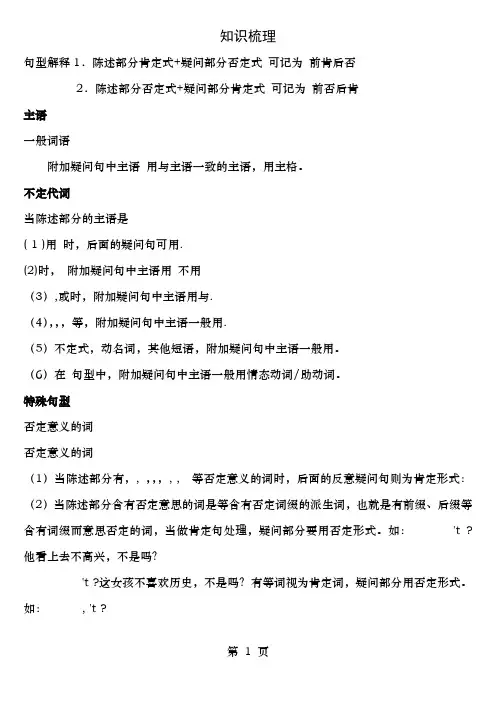
知识梳理句型解释1.陈述部分肯定式+疑问部分否定式可记为前肯后否2.陈述部分否定式+疑问部分肯定式可记为前否后肯主语一般词语附加疑问句中主语用与主语一致的主语,用主格。
不定代词当陈述部分的主语是( 1 )用时,后面的疑问句可用.(2)时,附加疑问句中主语用不用(3),或时,附加疑问句中主语用与.(4),,,等,附加疑问句中主语一般用.(5)不定式,动名词,其他短语,附加疑问句中主语一般用。
(6)在句型中,附加疑问句中主语一般用情态动词/助动词。
特殊句型否定意义的词否定意义的词(1)当陈述部分有,, ,,,, , 等否定意义的词时,后面的反意疑问句则为肯定形式:(2)当陈述部分含有否定意思的词是等含有否定词缀的派生词,也就是有前缀、后缀等含有词缀而意思否定的词,当做肯定句处理,疑问部分要用否定形式。
如:'t ?他看上去不高兴,不是吗?'t ?这女孩不喜欢历史,不是吗?有等词视为肯定词,疑问部分用否定形式。
如:, 't ?表示主语主观意愿的词含有, , , , 等动词后接宾语从句构成的主从复合句在构成反意疑问句时,视情况不同有两种不同的构成方式。
(1.)当主句的主语为第一人称时,其后的简短问句应与从句相一致。
例如:I , 't ?, 't ?值得注意的是,当这些动词后接的宾语从句的否定转移到主句时,其仍属否定句,故其后的简短问句应用肯定式,而非否定式。
例如:I 't , ?'t , ?此类句子的回答同"前否后肯"型反意疑问句一样,如上述后一个句子,若双胞胎已经到了,则回答为", .";若尚未到达,使用", 't."。
(2).当主句的主语为第二、三人称时,其后的简短问句则应与主句相一致(此时,否定只看主句,与从句无关...)。
例如:, 't ?, 't ?'t 's , ?'t , ?(3)但如果主句的时态是过去时等等,疑问句应与主句的人称时态保持一致。
反义疑问句讲解和练习(答案)
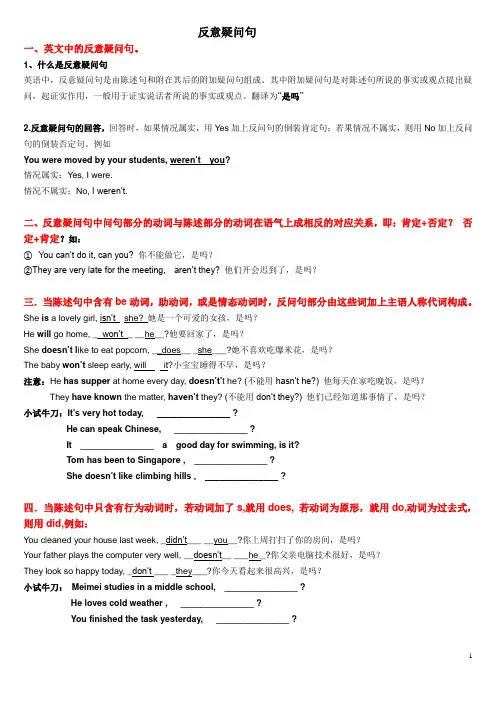
反意疑问句一、英文中的反意疑问句。
1、什么是反意疑问句英语中,反意疑问句是由陈述句和附在其后的附加疑问句组成。
其中附加疑问句是对陈述句所说的事实或观点提出疑问,起证实作用,一般用于证实说话者所说的事实或观点。
翻译为“是吗”2.反意疑问句的回答,回答时,如果情况属实,用Yes加上反问句的倒装肯定句;若果情况不属实,则用No加上反问句的倒装否定句。
例如You were moved by your students, weren’t you?情况属实:Yes, I were.情况不属实:No, I weren’t.二、反意疑问句中问句部分的动词与陈述部分的动词在语气上成相反的对应关系,即:肯定+否定?否定+肯定?如:①You can’t do it, can you? 你不能做它,是吗?②They are very late for the meeting, aren’t they? 他们开会迟到了,是吗?三.当陈述句中含有be动词,助动词,或是情态动词时,反问句部分由这些词加上主语人称代词构成。
She is a lovely girl, isn’t she? 她是一个可爱的女孩,是吗?He will go home, __won’t__ __he__?他要回家了,是吗?She doesn’t l ike to eat popcorn, __does__ _she___?她不喜欢吃爆米花,是吗?The baby won’t sleep early, will it?小宝宝睡得不早,是吗?注意:He has supper at home every day,doesn’t’t he? (不能用hasn’t he?) 他每天在家吃晚饭,是吗?They have known the matter, haven’t they? (不能用don’t they?) 他们已经知道那事情了,是吗?小试牛刀:It’s very hot today, _______________ ?He can speak Chinese, _______________ ?It _______________ a good day for swimming, is it?Tom has been to Singapore , _______________ ?She do esn’t like climbing hills , _______________ ?四.当陈述句中只含有行为动词时,若动词加了s,就用does, 若动词为原形,就用do,动词为过去式,则用did,例如:You cleaned your house last week, _didn’t___ __you__?你上周打扫了你的房间,是吗?Your father plays the computer very well, __doesn’t__ ___he _?你父亲电脑技术很好,是吗?They look so happy today, _don’t ___ _they___?你今天看起来很高兴,是吗?小试牛刀:Meimei studies in a middle school, _______________ ?He loves cold weather , _______________ ?You finished the task yesterday, _______________ ?五.反意疑问句的陈述部分带有little, few, never, hardly, seldom,nobody, nothing, barely, scarcely 等否定意义的词时,问句部分用肯定式。
反义疑问句[讲义+练习+答案]
![反义疑问句[讲义+练习+答案]](https://uimg.taocdn.com/bce1d8e9f705cc1755270943.webp)
反义疑问句一、英文中的反意疑问句。
1、什么是反意疑问句英语中,反意疑问句是由陈述句和附在其后的附加疑问句组成。
其中附加疑问句是对陈述句所说的事实或观点提出疑问,起证实作用,一般用于证实说话者所说的事实或观点。
翻译为“是吗”2.反意疑问句的回答,回答时,如果情况属实,用Yes加上反问句的倒装肯定句;若果情况不属实,则用No加上反问句的倒装否定句。
例如You were moved by your students, weren’t you?情况属实:Yes, I were.情况不属实:No, I weren’t.二、反意疑问句中问句部分的动词与陈述部分的动词在语气上成相反的对应关系,即:肯定+否定?否定+肯定?如:①You can’t do it, can you?你不能做它,是吗?②They are very late for the meeting, aren’t they?他们开会迟到了,是吗?三.当陈述句中含有be动词,助动词,或是情态动词时,反问句部分由这些词加上主语人称代词构成,Be动词包括:am, is, are, was, were助动词有:do, does, did, have(用在完成时), has(用在完成时)等情态动词有:can, could, may, might, must, will, would, shall, should例如:She is a lovely girl, isn’t she?她是一个可爱的女孩,是吗?He will go home, __won’t__ __he__?他要回家了,是吗?She doesn’t l ike to eat popcorn, __does__ _she___?她不喜欢吃爆米花,是吗?The baby won’t sleep early, will it?小宝宝睡得不早,是吗?注意:①He has supper at home every day,doesn’t’t he? (不能用hasn’t he?)他每天在家吃晚饭,是吗?②They have known the matter, haven’t they? (不能用don’t they?)他们已经知道那事情了,是吗?四.当陈述句中只含有行为动词时,若动词加了s,就用does, 若动词为原形,就用do,动词为过去式,则用did,例如:You cleaned your house last week, _didn’t___ __you__?你上周打扫了你的房间,是吗?Your father plays the computer very well, __doesn’t__ ___he _?你父亲电脑技术很好,是吗?They look so happy today, _don’t ___ _they___?你今天看起来很高兴,是吗?五.反意疑问句的陈述部分带有little, few, never, hardly, seldom,nobody, nothing, barely, scarcely等否定意义的词时,问句部分用肯定式。
反义疑问句详细讲解及习题及答案-反意疑问句-反义疑问句题目及答案解析
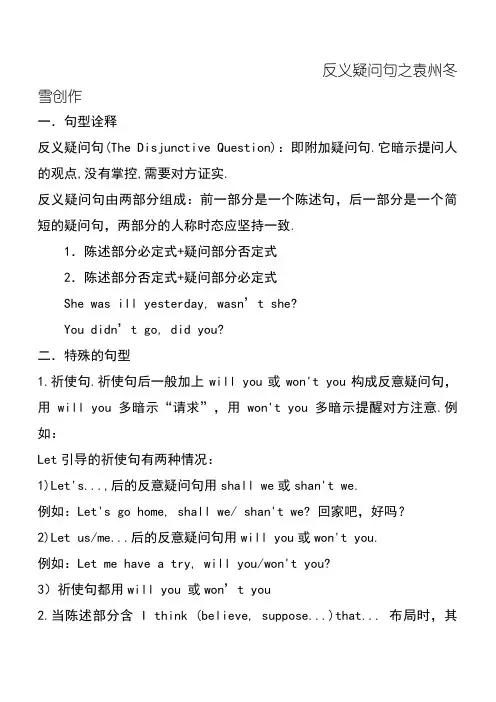
反义疑问句之袁州冬雪创作一.句型诠释反义疑问句(The Disjunctive Question):即附加疑问句.它暗示提问人的观点,没有掌控,需要对方证实.反义疑问句由两部分组成:前一部分是一个陈述句,后一部分是一个简短的疑问句,两部分的人称时态应坚持一致.1.陈述部分必定式+疑问部分否定式2.陈述部分否定式+疑问部分必定式She was ill yesterday, wasn’t she?You didn’t go, did you?二.特殊的句型1.祈使句.祈使句后一般加上will you或won't you构成反意疑问句,用will you 多暗示“请求”,用won't you 多暗示提醒对方注意.例如:Let引导的祈使句有两种情况:1)Let's...,后的反意疑问句用shall we或shan't we.例如:Let's go home, shall we/ shan't we? 回家吧,好吗?2)Let us/me...后的反意疑问句用will you或won't you.例如:Let me have a try, will you/won't you?3)祈使句都用will you 或won’t you2.当陈述部分含I think (believe, suppose...)that... 布局时,其反意疑问句须与从句的主、谓语坚持一致,注意主句的主语必须是第一人称.例如: I don't think he will come, will he?若是非第一人称,则与主句的主语相一致He thinks that she will come, doesn’t he?反意疑问句的陈述部分为I(We) don’t think(believe, suppose, consider)+ that从句时,从句为否定意义,问句部分的动词和主语仍与that从句坚持一致且用必定式.如:①I don’t think that you can do it, can you? (不必do I?)②We don’t believe that the news is true, is it? (不必do we?)反意疑问句的陈述部分为主语+said( told, reported, asked……) + that从句时,问句部分的动词和主语与陈述部分的主句动词和主语坚持一致.如:①They said that you had finished your work, didn’t they? (不必hadn’t you)②Kate told you that she would go there, didn’t she? (不必wouldn’t she?)3.当反意疑问句的陈述部分为从句时,若主句主语为 I ,反意部分的主语为从句主语;若不为 I ,反义部分的主语为主句主语.①I know your father is a worker, isn't he?①she knows your father is a worker, doesn’t she?4.当陈述部分含有以下这些含有否定意义的词时:few, little,seldom,hardly, never, not, no, no one, nobody, nothing, none, neither等,其反意疑问句需用必定布局.例如: He is never late for school, is he?5.当陈述部分所含的否定词是通过加前缀或后缀构成的,其后的反意疑问句依然用否定布局.例如:It is unfair, isn't it? 这不公平,是吧?6.陈述部分主、谓语是I am...时,反意疑问句用aren't I ,而不是am not I (可用am I not).例如:I'm working now, aren't I? 我在工作,是吗?7. 陈述部分的主语是everybody, everyone, anybody, anyone, somebody, someone, nobody, no one, none, neither 时, 其反意疑问句的主语需用复数代词they.例如:Everyone is here, aren't they? 大家都到了,是吗?No one knows about it, do they? 没有人知道这件事,对吗?8.陈述部分的主语是everything, nothing, anything或something 时,反意疑问句的主语应用代词it.例如:Something is wrong with my radio, isn't it?我的收音机出弊端了,是吧?9.陈述部分的主语是指示代词this或that时,反意疑问句的主语用it,当陈述部分的主语是指示代词these或those时,其反意疑问句的主语用they.例如:This is a plane, isn't it? 这是一架飞机,是吗?These are grapes,aren't they? 这些是葡萄,是吗?10.陈述部分的主语是不定代词one时,反意疑问句的主语可以用one,也可用you.例如:One should be ready to help others, shouldn't one?每一个人都应该乐于助人,是吧?11. 当陈述部分谓语动词是need, dare,且这些词被用作实义动词时,其反意疑问句需用do的适当形式.例如:He needs help, doesn't he?他需要帮忙,是吗?12.当陈述部分主语是从句、不定式(短语)、动词-ing形式时,反意疑问句的主语应该用it.例如:What you need is more important, isn't it?你需要的东西更重要,是吧?12.have(has)不是暗示“有”的意思,并在句中做谓语时,其反意疑问句的助动词要用do, does, did.例如:They had a meeting just now,didn't they?他们刚才开了个会,是吗?15.陈述部分有have to 时,其反意疑问句要用助动词的否定形式.例如:You have to water the vegetables every day, don't you? You had to water the vegetables every day, didn't you?16.He used to stay up late, usedn’t he/ didn’t he?17.陈述部分是there be句型时,其反意疑问句中要用there.There was a hospital here, wasn't there?18.陈述部分有had better时,反意疑问句中要用hadn't.例如:We’d better go to school at once, hadn't we?He’d rather go home, wouldn’t he?19.当陈述部分含有情态动词must时,我们便要分析一下must的含义.如果must 作“一定;要;必须”讲,反意疑问句须用mustn't或needn't;而当must作推测意义“一定是;必定”讲时,反意疑问句则需根据must后的动词原形选用相应的形式.例如: He must work hard at physics, mustn't he?他必须尽力学物理,是吧?Tom must be at home,isn't he? 汤姆一定在家,是吧①He might have forgotten his pen in the classroom yesterday, didn’t he?(不必mightn’t he?/ hasn’t he?)②You must have got up late this morning, didn’t you?(不必mustn’t you?/haven’t you?)20.反意疑问句的回答用yes, no,但是,回答意思相反,当陈述部分是否定形式时,回答要按事实.例如:They don’t work hard, do they?Yes, they do. 不,他们工作尽力./No, they don’t. 对,他们工作不尽力.反意疑问句的陈述部分为I am……时,问句部分习惯上用aren’t I?暗示.如:I am a very honest man, aren’t I?反意疑问句二反意疑问句是英语四大问句之一,它是由一个陈述句加上一个短问句而构成的.反意疑问句的基本构成形式是:陈述句+动词(必定或否定)+主语?如:①She often has lunch at school, doesn’t she? ②You don’t like sports, do you?一、反意疑问句中问句部分的动词与陈述部分的动词在语气上成相反的对应关系,即:必定+否定?否定+必定?如:①You can’t do it, can you? ②They are very late for the meeting, aren’t they?二、反意疑问句中问句部分的动词与陈述部分的动词种类要对应一致.如:①He has supper at home every day, doesn’t he? (不克不及用hasn’t he?)②They have known the matter, haven’t they? (不克不及用don’t they?)三、反意疑问句中问句部分的动词在时态上应和陈述部分的时态一致.如:①They will go to town soon, won’t they?(不克不及用don’t they?或aren’t they?)②He works very hard, doesn’t he?(不克不及用didn’t he?或won’t he?)四、反意疑问句的陈述部分带有little, few, never, hardly, seldom 等否定意义的词时,问句部分用必定式.如:①She never tells a lie, does she?(不必doesn’t she?)②He was seldom late, was he?(不必wasn’t he?)五、反意疑问句的陈述部分含有由un-, im-, in-, dis-, 等否定意义的前缀构成的词语时,陈述部分要视为必定含义,问句部分用否定形式.如:①Your father is unhappy, isn’t he?(不克不及用is he?)②The man is dishonest, isn’t he? (不克不及用is he?)六、反意疑问句的陈述部分为I am……时,问句部分习惯上用aren’t I?暗示.如:I am a very honest man, aren’t I?八、反意疑问句的陈述部分为I(We) don’t think(believe, suppose, consider)+ that从句时,从句为否定意义,问句部分的动词和主语仍与that从句坚持一致且用必定式.如:①I don’t think that you can do it, can you? (不必do I?)②We don’t believe that the news is true, is it? (不必do we?)九、反意疑问句的陈述部分为非第一人称主语+ think(believe, suppose, consider) + that从句时,问句部分的动词和主语与陈述部分的主句动词和主语坚持一致.如:①They all think that English is very important, don’t they? (不必isn’t it?)②He didn’t think that the news was true, did he? (不必w asn’t/ was it?)十、反意疑问句的陈述部分为主语+said( told, reported, asked……) + that从句时,问句部分的动词和主语与陈述部分的主句动词和主语坚持一致.如:①They said that you had finished your work, didn’t they? (不必hadn’t you)②Kate told you that she would go there, didn’t she? (不必wouldn’t she?)十一、陈述部分的主语为不定代词something, anything, nothing, everything时,问句部分的主语用it.如:①Something is wrong with the computer, isn’t it?②Nothing has happened to them, has it?十二、陈述部分的主语为不定代词somebody(someone),anybody(anyone), nobody(no one), everybody(everyone)时,问句部分的主语用he或 they,这时问句动词的数应和he或 they一致.如:①Someone has taken the seat, hasn’t he?②Everyone has done their best in the game, haven’t they?十三、陈述部分为Let me……时,问句部分习惯上用shall I? 或will you?形式.如:Let me have a try, shall I?(will you?)十四、陈述部分为Let us……时,问句部分习惯上用will you? 陈述部分为Let’s……时,问句部分习惯上用shall we?如:Let us stop to rest, will you?Let’s go home together, shall we?十六、陈述部分用上述情况以外的祈使句时,问句部分一般用will you?形式暗示请求,用won’t you?形式暗示委婉请求或邀请.如:①Do sit down, won’t you?/ will you? ②Jim,you feed the bird today, will you?③Please open the window, will you?(won’t you?)十七、陈述部分为否定祈使句时,问句部分一般用will you?如:Don’t make any noise, will you?十八、陈述部分为There (Here) + be + 主语时,问句部分用动词+there(here)?.如:①There are two cakes on the plate, aren’t there?②Here is a story about Mark Twain, isn’t here?十九、陈述部分用had better +原形动词暗示建议时,问句部分用hadn’t +主语?.①You’d better tell him about the matter, hadn’t you?②We had better do it by ourselves, hadn’t we?二十、陈述部分用used to +主语时,问句部分用didn’t + 主语?或usedn’t①He used to live in the country, didn’t he?/usedn’t he?②They used to be good friends, didn’t they?/usedn’t they?二十一、陈述部分用must(may, might) + have + V-ed暗示推测时,若句中带有分明的过去时间的状语,问句部分动词用过去时形式.如:①He might have forgotten his pen in the classroom yesterday, didn’t he?(不必mightn’t he?/ hasn’t he?)②You must have got up late this morning, didn’t you?(不必mustn’t you?/haven’t you?)二十二、陈述部分用must(may, might) + have + V-ed暗示推测时,若句中没有带分明的过去时间的状语,问句部分动词用现在完成时形式.如:①Everyone must have known the death of the waitress, haven’t they? (不必mustn’t they?)②You must have worked there a year ago, didn’t you?(不必mustn’t you?/ haven’t you?)二十三、陈述部分的主语为从句时,问句部分的主语一般用it代替,如:①What he said is true, isn't it? (不必didn’t he?)②Where we will build the dam has not been decided yet, has it? (不必won’t we?)二十四、陈述部分的主语为动名词或不定式时,问句的主语用it代替.如:①To do one good deed is easy for a person, isn't it?②Skating is your favorite sport, isn't it?反意疑问句考点反意疑问句是高考重要考点,其构成形式是"必定 + 否定"和"否定 + 必定",但也有一些特例.本文连系高测验题,对反意疑问句的易考点停止归纳.1. 陈述句部分的谓语是be, had better或情态动词等时,反意疑问句仍用这些动词.[原题再现]Bill's aim is to inform the viewers that cigarette advertising on TV is illegal, ________?A. isn't itB. is itC. isn't heD. is he答案: A2. 陈述部分的谓语是have时,若have作"有"解,反意疑问部分用have (has) 或do (does)的必定或否定式; 若have作使役动词,则只能用do (does, did)的适当形式停止反问.[原题再现]His wife had the front door painted green yesterday,________she?A. didB. hadC. didn'tD. hadn't答案: C3. 陈述部分含有no, never, seldom, hardly, few, little, nowhere, nothing等否定意义的词时,反意疑问部分用必定形式;但陈述部分若使用含有否定意义的前缀或后缀的词时,反意疑问部分仍然使用否定形式. [原题再现]He seldom has lunch at school, ________?A. hasn't heB. has heC. doesn't heD. does he答案: DThey dislike English, don't they? 他们不喜欢英语,不是吗?4、含有下列情态动词时构成的反意疑问句形式a、陈述句有had better时,问句中用had (hadn’t) .You’d better go home now, hadn’t you?b、陈述句中有 must暗示“必须”时问句用 needn't或 mustn'tYou must do your homework, mustn't you?/ needn't you?We mustn’t go home, must (need) we?c、must暗示“推测”时,问句中则不克不及用情态动词,而需要用其它形式.如:She must be in the room, isn’t she?You must have been to Shanghai, haven’t you?[原题再现]There is no light in the dormitory. They must have gone to the lecture, ________?A. didn't theyB. don't theyC. mustn't theyD. haven't they答案: D5. 陈述部分的主语是everyone, everybody, anyone, anybody, someone, no one等不定代词时,其疑问部分的主语可根据句子的内在选用he或they.例如:Everyone knows his job, doesn't he?Everyone had lent you a hand when you were in trouble, hadn't they?6. 陈述部分的主语是something, anything, everything, nothing等不定代词,其疑问部分的主语一般用it.例如:Everything is ready, isn't it?Nothing goes well, does it?7. 陈述部分是there be句型时,反意疑问部分用"...there?".[原题再现]There's not much news in today's paper, ________?A. isn't itB. are thereC. is thereD. aren't there答案: C8. 陈述部分谓语含有used to时,反意疑问部分可用usedn't,也可用didn't;陈述部分含有ought to时,反意疑问部分可用oughtn't或shouldn't两种形式.例如:Tom used to make fun of Peter, usedn't / didn't he?We ought to learn the law knowledge by heart, oughtn't / shouldn't we?9. 陈述部分的主语是this, that,不定式短语、动名词短语或从句时,反意疑问部分的主语用it;陈述部分的主语是these, those时,反意疑问部分的主语用they.例如:This is a most wonderful place, isn't it?Learning a foreign language well takes a long time, doesn't it? That they are close friends doesn't seem true, does it?10. 陈述部分的主语后有同位语从句或定语从句修饰时,反意疑问部分仍应对主句主语停止反问.[原题再现]The news that they failed their driving test discouraged him, ________?A. did theyB. di dn't theyC. did itD. didn't it答案: D11. 陈述部分为含有宾语从句的主从复合句时,通常要对主句主语停止反问;但若陈述部分是"I (don't) think / suppose / believe / imagine / expect等 + 宾语从句"时,要对宾语从句的主语停止反问,同时要注意否定转移现象.[原题再现]I don't suppose anyone will volunteer, ________?A. do IB. don't IC. will theyD. won't they答案: C12. 陈述部分为祈使句时,不管祈使句是必定形式还是否定形式,反意疑问部分通常常使用will you;但Let's引起的祈使句的反意疑问句部分通常常使用shall we.[原题再现]If you want help-money or anything, let me know, ________ you? A. don't B. will C. shall D. do答案: B13、陈述句部分是"I wish…"句型时,附加问句部分用may I.例如:I wish I were you, may I? 我希望我是你,可以吗?I wish her to come here, may I? 我希望她到这儿来,可以吗?预测题1.Nobody says a word about the incident, ___________?A. is he B. doesn’t he C. do they D. don’t they2.You never told me why you were late for the class, ___________?A. weren’t you B. didn’t you C. had you D. did you3.They dare not call you a fool, ___________?A. would they B. dared they C. dares they D. dare they4.There is not much news in today’s paper,_____________?A. isn’t it B. are there C. is there D. aren’t there 5.The manager came here in a car, ________?A. was he B. did he C. wasn’t he D. didn’t he6.She must have arrived thereyesterday, _________?A. have she B. must she C. didn’t she D. mustn’t she7.Peter hardly ever goes to parties, _______?A. doesn’t he B. do he C. does he D. is he8.What a lovely day,_________?A. doesn’t it B. isn’t it C. shan’t it D. hasn’t it9.Let me do it, _______?A. shall I B. shall weC. will you D. will I10.Nothing he did was right, ___________?A. did he B. was it C. didn’t it D. was he11.There used to be a church behind the cemetery, ________?A. didn’t there B. used th ere C. usedn’t itD. didn’t it12.He must be in the library now,________?A. doesn’t he B. mustn’t he C. needn’t he D. isn’t he13.You would rather not have fish, _________ you?A. hadn’t B. wouldn’t C. would D. had14.----You are not a new member, are you? ---- _________. I joined only yesterday.A. No, I’m not B. Yes, I’m not C. No, I am D. Yes, I am15.My sister often needs help with her study, _______?A. need she B. needn’t she C. does she D. doesn’t she16.You’d better send for a doctorfor your mother, ________ you?A. had B. hadn’t C. would D. wouldn’t17.Let’s go swimming, _________?A. aren’t we B.shall we C. will you D. won’t we18.Li Ming can’t be in the classroom, __________?A. can he B. is he C. can’t he D. musthe19.He ought to have looked after his father, _________?A. oughtn’t he B. ought he not to C. oughtn’t he to D. oughtn’tto he20.I have nothing to do with the matter, ________?A. haveI B. has it C. do I D. does it21.He was in good heath when I saw him last time, _________?A. wasn’t he B. didn’t h e C. hadn’t he D. hasn’t he22.John had his hair cut yesterday afternoon, ________?A. haven’t he B. didn’t he C. hadn’t he D. hasn’t he23.None of the pupils attended the sports meet,________?A. did they B. do they C. didn’t they D. don’tthey24.I’d like to go with you, _______?A. had I B. wouldn’tI C. hadn’t I D. would I25.It is the third time that John has been late, ______?A. hasn’t he B. isn’t he C. isn’t it D. hasn’t it26.I suppose he is serious, ________?A. do I B.don’t I C. is he D. isn’t he27.She d islikes this skirt,_________?A. doesn’t she B. does she C. isn’t she D. isshe28.You mustn’t tell it to your mother, ________?A. must you B. do you C. need you D. will you29.They have to face the difficulty, ________?A. haven’t they B. don’t they C. do th ey D. must they30.The man in blue must be your brother, _______?A. mustn’t he B. needn’t he C. isn’t he D. is he答案与提示:当陈述部分中的主语为everybody, everyone, someone, no one, nobody, somebody等不定代词时,反意疑问句部分中的主语常常使用they.且陈述部分为否定意义的词nobody, 反意疑问部分应用必定形式.当陈述部分是主从复合句时,反意疑问部分中的动词和主语代词通常应和主句中的动词和主语坚持一致.当陈述部分中含有情态动词dare 时,反意疑问部分也应用情态动词dare(没有人称和数的变更)陈述句部分含有not,是否定式,所以反意疑问部分应用必定式.而且当陈述部分是there be布局时,反意疑问部分用there,省略主语代词. 当陈述部分的动词是行为动词时,而且前面又没有任何助动词时,这时的疑问部分要用do/does/did. 如果must have done句式中的时间状语为暗示过去的时间的词,如last year, yesterday, the day before yesterday等,反意疑问部分常常使用didn’t + 主语. 如果陈述部分已有暗示否定意义的副词,如never, nothing, seldom, rarely, hardly等时,反意疑问部分应用必定形式. 当陈述句部分为感叹句时,反意疑问句部分常常使用否定形式,且问句部分的动词常常使用be. 当陈述部分是祈使句时,反意疑问部分常常使用will you. 当陈述部分的主语是everything, anything, nothing, something等表物的不定代词时,反意疑问部分的主语常常使用it. 当陈述部分是there be布局时,反意疑问部分用there,省略主语代词.当陈述部分含有情态动词used to时,反意疑问部分可用used to形式或did形式.所以此空应填didn’t there 或usedn’t there.12.D must/ may/ can’t + do 暗示对现在情况的推测,反意疑问部分用一般现在时.He must be in the library now.相当于当陈述句部分含had better/best, would like to, would rather等约定俗成特殊短语时,反意疑问部分应保存第一个词.如此题中的陈述部分含有would rather的否定式,则反意疑问部分用would. 反意疑问句的答语应根据实际情况往返答,如果事实是必定的,前面要用yes,否则用no.回答中的必定否定关系可以用下面这个公式暗示:(+暗示必定,-暗示否定)问句中:+,-或-,+回答中:+,+或-,-陈述句部分含有实义动词needs, 所以反意疑问部分要用助动词doesn’t.当陈述部分有had better时,反意疑问部分应用hadn’t.当陈述部分是祈使句时,反意疑问部分常常使用will you. 但以Let’s 开首的祈使句,反意疑问部分常常使用shall we. 以Let us开首的祈使句,反意疑问部分常常使用will you. 当陈述部分含有情态动词must, may, can’t, 且暗示推测时,反意疑问部分不克不及用must, may, can’t自身,应和后面的实义动词坚持一致. Ling Ming can’t be in the classroom.相当于:当陈述部分含有情态动词ought to 时,反意疑问部分常常使用oughtn’t.本题中的陈述部分中的have是实义动词,不作“有”解,所以反意疑问部分应需借助助动词do, does, did等来完成. 当陈述部分是主从复合句时,反意疑问部分中的动词和主语代词通常应和主句中的动词和主语坚持一致.此题的主句是:本题中的陈述部分中的had是实义动词,不作“有” 解,所以反意疑问部分应需借助助动词did来完成. 当陈述部分的主语是everybody, everyone, someone, none, nobody, somebody等不定代词时,反意疑问句部分中的主语常常使用they.本题中的陈述句部分用的一般过去时态. 当陈述部分中有would like时,反意疑问部分应用wouldn’t.当陈述句部分是强调句或近似强调句的布局时,反意疑问部分常和句首的It is/was坚持一致.当陈述部分的主句是I suppose, I think, I believe, I imagine等布局时,反意疑问部分往往与从句坚持一致,而且要注意否定转移. 当陈述部分中含有im, in, dis, un等否定前缀或less等否定后缀时,应把陈述部分当作是必定的,反意疑问部分要用否定式. 当陈述部分含有情态动词mustn’t暗示“制止”时,反意疑问部分常常使用must. 当陈述部分含有have,而且have作“有”解时,反意疑问部分用have/has 或借助助动词do, does, did等来完成;如果陈述部分中的have是实义动词,则反意疑问部分应需借助助动词do, does, did等来完成.本题陈述部分中的have to (不克不及不)为实义动词,所以反意疑问部分不克不及用haven’t.当陈述部分是must,may, can’t, 且暗示推测时,反意疑问部分不克不及用must, may, can’t自身,应和后面的实义动词坚持一致. 本题中的陈述部分The man in blue must be your brother相当于:I think the man in blue is your brother.反意疑问句操练二1. I suppose the shoes will last you at least one year, ____________?A. won’t theyB. will theyC. do ID. don’t2. Everyone is surprised at the news, _____________?A, is he B. are they C. aren’t they D. is not he3. ----- You will come to have dinner with us, won’t you?----- ____________A. Excuse me, I won’t.B. I haven’t been there.C. You are welcome.D. Yes. That’s very nice of you.4. Tom isn’t a hard-working student, for it is the third time he has been late, ______________?A. wasn’t itB. hasn’t itC. isn’t itD. hasn’t he5. You don’t have to go school on Sundays, _____________ you?A. haveB. doC. shouldD. would6. I don’t think he had his supper at the school, _____________?A. had heB. did heC. do ID. don’t you7.I don’t think he’d like to take such a diffi cult job, __________?A. had heB. would heC. do ID. don’t you8. I don’t think her passport’s gone, __________?A. is itB. has sheC. do ID. don’t you9. Do pay attention to my work and keep your eyes open all the time, ____________?A. will youB. don’t youC. shall weD. won’t we10. All the drivers dislike driving on the narrow roads ________________?A. don’t theyB. don’t each of themC. do ID. don’tyou11. Let’s go and have a walk,___________?A. doB. shallC. haven’tD. shan’t12. Go and fetch a chair for him, ___________?A. don’t youB. shall youC. won’t youD. will you13. There used to be a shop behind the factory, ________________?A. didn’t thereB. used thereC. usedn’t it C. didn’t it14. I’m sure he must have been sleeping at the moment, __________?A. aren’t I B, mustn’t C. wasn’t he D. hasn’t15. I had to tell the truth, __________?A. hadn’t IB. wouldn’t IC. didn’t ID. shouldn’t I16.------- Why is Tom absent now ?-------He must be sick,________________?A. isn’t heB. must heC. is heD. mustn’t he17, He’d like to have a look at your picture,_________-he ?A. hadn’tB. didn’t C .couldn’t D .wouldn’t18. You don’t t hink he will come,_________?A. do youB. will youC. will heD. won’t he19. Let’s go home, shall we? _________.A. That’s right.B. That’s allC. That’s all rightD. All right20. Jack had dinner with his mother at home yesterday,A. didB. doesC. didn’tD. hadn’t21. Let John finish the work all by himself,___________?A. shall weB. will youC. do youD. do we22.I don’t think it is going to rain, _____________ it?A. do IB. do youC. isD. isn’t23. Nothing the boy did was right, _______ it?A. wasB. didC. wasn’t C. didn’t24. It’s the first time that she has been to the United States, ____________?A. isn’t sheB. isn’t itC. hasn’t sheD. hasn’t it25. He was hardly able to stand on his feet after the car accident,__________ he?A. couldB. couldn’tC. wasD. wasn’t26. Jack seldom goes to the park, _______________?A. does heB. doesn’t heC. does JackD. doesn’t Jack27. People use tag question (反意疑问) because they are notsure of what they have said _____________they?A. doB. didC. didn’tD. don’t28. Everyone wants to be chosen for the work, ____________?A. isn’t heB. does heC. don’t theyD. do they29. She is going to see you ,_________ she ?A. isn’tB. isC. don’tD. doesn’t30. They used to live in these mountain areas ,_____________ they?A. didB. didn’tC. usedD. weren’t31. He ought to go by plane, _____he ?A. shouldn’tB. wouldn’tC. shouldD. would32. Lovely weather! ___________?A. Yes. You are right.B. Yes ,isn’t itC. No, it isD. No, you are wrong33. ---------- You must do as I tell you.----------Oh, I must, ____________I?A. shouldB. mustn’tC. oughtD. must34. We must start earlier,__________ we?A. needn’tB. mustn’tC. don’tD. mustn’t35. You must have studied English for many years, _________ you?A. didn’tB. haven’tC. needn’tD. mustn’t36. She must have arrived there yesterday, __________ she ?A. didn’tB. hasn’tC. needn’tD. mustn’t37. We mustn’t be late, __________ we?A. mustB. mayC. areD. A&B38, I needn’t show h er the keys to the question, ________ I?A. mustB. needC. canD. do39. We need to practice speaking English more often, ___________ we?A. mustn’tB. needn’tC. can’tD. don’t40. I have to work this afternoon,__________ I? A. don’t C, haven’t D. doKEY. 1--10 ACDCB BBAAA 11-20 BDACC ADADC21-30 BCABC ADCAB 31-40 ABDAB ADBDC。
反义疑问句讲解和练习(答案)
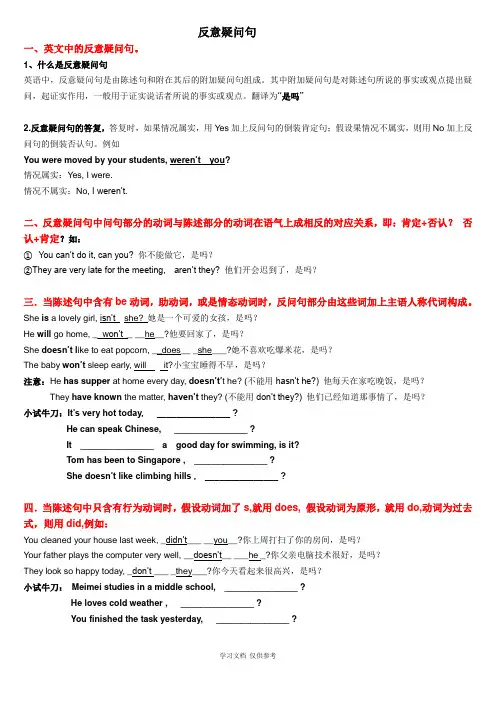
反意疑问句一、英文中的反意疑问句。
1、什么是反意疑问句英语中,反意疑问句是由陈述句和附在其后的附加疑问句组成。
其中附加疑问句是对陈述句所说的事实或观点提出疑问,起证实作用,一般用于证实说话者所说的事实或观点。
翻译为“是吗”2.反意疑问句的答复,答复时,如果情况属实,用Yes加上反问句的倒装肯定句;假设果情况不属实,则用No加上反问句的倒装否认句。
例如You were moved by your students, weren’t you?情况属实:Yes, I were.情况不属实:No, I weren’t.二、反意疑问句中问句部分的动词与陈述部分的动词在语气上成相反的对应关系,即:肯定+否认?否认+肯定?如:①You can’t do it, can you? 你不能做它,是吗?②They are very late for the meeting, aren’t they? 他们开会迟到了,是吗?三.当陈述句中含有be动词,助动词,或是情态动词时,反问句部分由这些词加上主语人称代词构成。
She is a lovely girl, isn’t she? 她是一个可爱的女孩,是吗?He will go home, __won’t__ __he__?他要回家了,是吗?She doesn’t l ike to eat popcorn, __does__ _she___?她不喜欢吃爆米花,是吗?The baby won’t sleep early, will it?小宝宝睡得不早,是吗?注意:He has supper at home every day,doesn’t’t he? (不能用hasn’t he?) 他每天在家吃晚饭,是吗?They have known the matter, haven’t they? (不能用don’t they?) 他们已经知道那事情了,是吗?小试牛刀:It’s very hot today, _______________ ?He can speak Chinese, _______________ ?It _______________ a good day for swimming, is it?Tom has been to Singapore , _______________ ?She d oesn’t like climbing hills , _______________ ?四.当陈述句中只含有行为动词时,假设动词加了s,就用does, 假设动词为原形,就用do,动词为过去式,则用did,例如:You cleaned your house last week, _didn’t___ __you__?你上周打扫了你的房间,是吗?Your father plays the computer very well, __doesn’t__ ___he _?你父亲电脑技术很好,是吗?They look so happy today, _don’t ___ _they___?你今天看起来很高兴,是吗?小试牛刀:Meimei studies in a middle school, _______________ ?He loves cold weather , _______________ ?You finished the task yesterday, _______________ ?五.反意疑问句的陈述部分带有little, few, never, hardly, seldom,nobody, nothing, barely, scarcely 等否认意义的词时,问句部分用肯定式。
(完整版)初中英语反义疑问句讲解_练习及答案
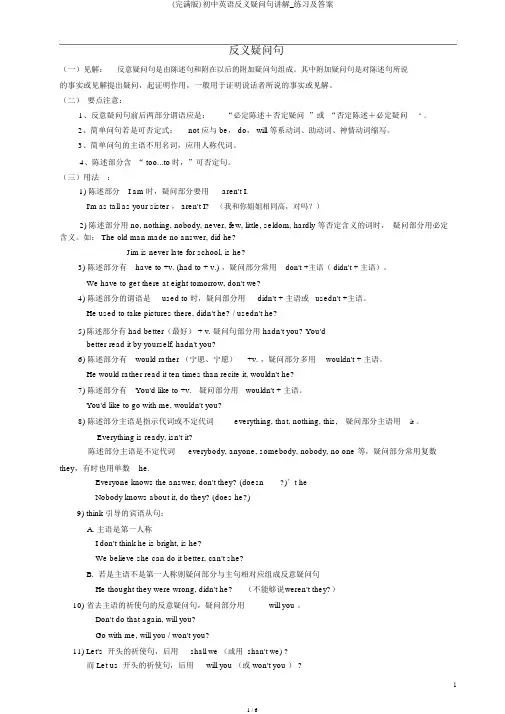
反义疑问句(一)见解:反意疑问句是由陈述句和附在以后的附加疑问句组成。
其中附加疑问句是对陈述句所说的事实或见解提出疑问,起证明作用,一般用于证明说话者所说的事实或见解。
(二)要点注意:1、反意疑问句前后两部分谓语应是:“必定陈述+否定疑问”或“否定陈述+必定疑问”。
2、简单问句若是可否定式:not 应与 be, do, will 等系动词、助动词、神情动词缩写。
3、简单问句的主语不用名词,应用人称代词。
4、陈述部分含“ too...to时,”可否定句。
(三)用法:1) 陈述部分I am 时,疑问部分要用aren't I.I'm as tall as your sister , aren't I?(我和你姐姐相同高,对吗?)2) 陈述部分用 no, nothing, nobody, never, few, little, seldom, hardly 等否定含义的词时,疑问部分用必定含义。
如: The old man made no answer, did he?Jim is never late for school, is he?3) 陈述部分有have to +v. (had to + v.) ,疑问部分常用don't +主语( didn't + 主语)。
We have to get there at eight tomorrow, don't we?4) 陈述部分的谓语是used to 时,疑问部分用didn't + 主语或usedn't +主语。
He used to take pictures there, didn't he? / usedn't he?5)陈述部分有 had better(最好) + v. 疑问句部分用 hadn't you? You'dbetter read it by yourself, hadn't you?6) 陈述部分有would rather (宁愿、宁愿)+v. ,疑问部分多用wouldn't + 主语。
反义疑问句详解及练习和答案
反义疑问句(前肯后否或前否后肯,疑问部分用逗号隔开)即附加疑问句。
它表示提问人的看法,没有把握,需要对方证实。
它表示提问人的看法,没有把握,需要对方证实。
反义疑问句由两部分组成:前一部分是一个陈述句,后一部分是一个简短的疑问句,两部分的人称时态应保持一致。
1.陈述部分肯定式+疑问部分否定式2.陈述部分否定式+疑问部分肯定式They work hare, don’t they?She was ill yesterday, wasn’t she?You didn’t go, did yo u?He can’t ride a bike, can he?请注意以下句型的反义疑问句的用法:1.当陈述部分的主语是I,而句子又用来征询对方的意见时,附加疑问句中的主语用you。
如:I find English very interesting, don’t you?I don’t like that film, do you?2.当陈述部分的主语是everybody, everyone, someone, nobody, no one, somebody等合成代词时,附加疑问句中的主语通常用they。
但亦可用he,尤其是nobody, no one等作主语,具有否定概念时。
如:Somebody phoned while I was out, didn’t they?Nobody wants to go there, does he?3.当陈述部分的主语是不定代词everything, nothing, anything, something时,附加疑问句中的主语一般用it,不用they。
如:Everything seems all right now, doesn’t it?Nothing is kept in good order, is it?Something must be done to stop pollution, isn’t it?4.当陈述部分的主语是指示代词this, that或these, those时,附加疑问句中的主语分别用it和they。
(完整)反义疑问句讲解和练习(答案)
反意疑问句一、英文中的反意疑问句。
1、什么是反意疑问句英语中,反意疑问句是由陈述句和附在其后的附加疑问句组成。
其中附加疑问句是对陈述句所说的事实或观点提出疑问,起证实作用,一般用于证实说话者所说的事实或观点.翻译为“是吗”2。
反意疑问句的回答,回答时,如果情况属实,用Yes加上反问句的倒装肯定句;若果情况不属实,则用No 加上反问句的倒装否定句。
例如You were moved by your students,weren’t you?情况属实:Yes, I were.情况不属实:No, I weren’t。
二、反意疑问句中问句部分的动词与陈述部分的动词在语气上成相反的对应关系,即:肯定+否定?否定+肯定?如:①You can't do it, can you?你不能做它,是吗?②They are very late for the meeting, aren’t they?他们开会迟到了,是吗?三.当陈述句中含有be动词,助动词,或是情态动词时,反问句部分由这些词加上主语人称代词构成。
She is a lovely girl,isn’t she?她是一个可爱的女孩,是吗?He will go home, __won’t__ __he__?他要回家了,是吗?She doesn’t l ike to eat popcorn, __does__ _she___?她不喜欢吃爆米花,是吗?The baby won't sleep early, will it?小宝宝睡得不早,是吗?注意:He has supper at home every day,doesn’t’t he? (不能用hasn’t he?)他每天在家吃晚饭,是吗?They have known the matter,haven’t they? (不能用don’t they?)他们已经知道那事情了,是吗?小试牛刀:It’s very hot today, _______________ ?He can speak Chinese, _______________ ?It _______________ a good day for swimming, is it?Tom has been to Singapore , _______________ ?She do esn’t like climbing hills , _______________ ?四.当陈述句中只含有行为动词时,若动词加了s,就用does, 若动词为原形,就用do,动词为过去式,则用did,例如:You cleaned your house last week, _didn’t___ __you__?你上周打扫了你的房间,是吗?Your father plays the computer very well, __doesn’t__ ___he _?你父亲电脑技术很好,是吗?They look so happy today, _don’t ___ _they___?你今天看起来很高兴,是吗?小试牛刀: Meimei studies in a middle school, _______________ ?He loves cold weather , _______________ ?You finished the task yesterday, _______________ ?五.反意疑问句的陈述部分带有little, few, never, hardly, seldom,nobody, nothing,barely, scarcely等否定意义的词时,问句部分用肯定式.如:①She never tells a lie, does she?(不用doesn’t she?)她从不说谎,是吗?②He was seldom late, was he?(不用wasn’t he?) 他几乎不迟到,是吗?小试牛刀:Few students can answer the question, _______________ ?He can hardly finish his homework, _______________ ?六、反意疑问句的陈述部分为I am……时,问句部分习惯上用aren’t I?表示.如:I am a very honest man, aren’t I? 我是个很诚实的人,是吗?小试牛刀:I’m in Class 3,Grade 2, _______________ ?I’m ten years old, _______________ ?七.陈述部分的主语为不定代词something, anything, nothing, everything时,问句部分的主语用it。
(完整版)反义疑问句详细讲解及习题及答案
反义疑问句一.句型解释反义疑问句(The Disjunctive Question):即附加疑问句。
它表示提问人的看法,没有把握,需要对方证实。
反义疑问句由两部分组成:前一部分是一个陈述句,后一部分是一个简短的疑问句,两部分的人称时态应保持一致。
1.陈述部分肯定式+疑问部分否定式2.陈述部分否定式+疑问部分肯定式She was ill yesterday, wasn’t she?You didn’t go, did you?二.特殊的句型1.祈使句。
祈使句后一般加上will you或won't you构成反意疑问句,用will you 多表示“请求”,用won't you 多表示提醒对方注意。
例如:Let引导的祈使句有两种情况:1) Let's...,后的反意疑问句用shall we或shan't we。
例如:Let's go home, shall we/ shan't we? 回家吧,好吗?2)Let us/me...后的反意疑问句用will you或won't you。
例如:Let me have a try, will you/won't you?3)祈使句都用will you 或won’t you2.当陈述部分含I think (believe, suppose...)that... 结构时,其反意疑问句须与从句的主、谓语保持一致,注意主句的主语必须是第一人称。
例如:I don't think he will come, will he?若是非第一人称,则与主句的主语相一致He thinks that she will come, doesn’t he?反意疑问句的陈述部分为I(We) don’t think(believe, suppose, consider)+ that从句时,从句为否定意义,问句部分的动词和主语仍与that从句保持一致且用肯定式。
反义疑问句详解+练习+答案
反义疑问句:反意疑问句由“陈述句+简略疑问句”两部分组成,第一部分提出一种看法,第二部分用来质疑或表示证实。
陈述部分与疑问部分的动词时态和动词性质应保持一致,而且肯定和否定形式彼此相反,即陈述部分为肯定式时,疑问部分用否定式,陈述部分为否定式时(前否后肯,前肯后否)疑问部分根据前面是否肯定/否定而定:He likes English,doesn’t he?他喜欢英语,是吗?He doesn’t like English,does he?他不喜欢英语,是吗?看一看:1.陈述句部分与附加疑问句部分意思相反:前肯后否、前否后肯。
如:Mary is a teacher,_isn’t she___?He didn't tell you the story,did he__?2.反意疑问句基本对应形式如下:(1)be动词对应be动词。
如:She is a policewoman,_isn’t she__?(2)情态动词对应情态动词。
如:He can drive the car,can’t he___?(3)行为动词对应助动词的相应形式。
这种助动词主要指帮助构成疑问句或否定句的do/does/did,以及它们的否定形式。
如:He slept for9hours yesterday,_didn’t he__?He didn't go to the park,__did he__?1.若陈述部分含有hardly,never,few,nothing,little,nobody,seldom 等否定词或半否定词,其疑问部分要用肯定式:He has few friends here,has he?他在这儿几乎没什么朋友,是吗?She said nothing,did she?她什么也没说,是不是?2.当陈述部分为为there be句型时,疑问部分仍用there作“主语”:例如:There was nothing in the room,was there?房间里什么也没有,是吗?3.当陈述部分的主语是复合不定代词时,若陈述部分的主语为somebody, someone,everyone,everybody,no one,nobody等复合不定代词,其反意疑问句的主语在正式文体中用he,在口语或非正式文体中通常用they例如:Nobody was late,were they?没有一个人迟到,是吗?4.当陈述部分的主语是something,anything,nothing,everything等复合不定代词时,其反意疑问句的主语要用it:例如:Everything is ready,isn’t it?一切都准备好了吗?5.当陈述部分是I’m…时,疑问部分通常用aren’t例如:I’m wrong,aren’t I?我错了,是吗?6.当陈述部分是I wish…时,疑问部分通常用may I例如:I wish to go with them,may I?我想同他们一起去,可以吗?认一认:几种特殊的反义疑问句1.基本原则:若陈述部分为祈使句,疑问部分通常用will you:Please help us,will you?请帮帮我们,好吗?Come with us,will you?同我们一起去,好吗?2.当祈使句为Let’s…时,疑问部分总是用shall weLet’s go there together,shall we?我们一起去,好吗?3.当祈使句为Let us…时,若表示请求,疑问部分用will you,若表示建议,疑问部分用shall we:Let us know your address,will you?请把你的地址告诉我们,好吗?Let us go swimming together,shall we?我们一起去游泳好吗?能力提升:完成下列反义疑问句1.He has a lot of work to do,___doesn’t______he___?2、Uncle Wang forgot to bring your bag,___didn’t______he___?3、There’re more than ten pandas on the hill,__isn’t___there__?4、Tom wants to get his TV set back,__doesn’t_____he___?5、It’s fine today,_isn’t___it__?6、Mary’s just come back from America,_hasn’t___she___?7、Danny bought some shampoo in the supermarket,___didn’t______he___?8、Nobody was looking for me,___was______he___?9、He needs our help,__doesn’t____he__?10.Let us stop to rest,__will_you_?。
- 1、下载文档前请自行甄别文档内容的完整性,平台不提供额外的编辑、内容补充、找答案等附加服务。
- 2、"仅部分预览"的文档,不可在线预览部分如存在完整性等问题,可反馈申请退款(可完整预览的文档不适用该条件!)。
- 3、如文档侵犯您的权益,请联系客服反馈,我们会尽快为您处理(人工客服工作时间:9:00-18:30)。
反义疑问句详细讲解及习题及答案标准化管理处编码[BBX968T-XBB8968-NNJ668-MM9N]反义疑问句一.句型解释反义疑问句(The Disjunctive Question):即附加疑问句。
它表示提问人的看法,没有把握,需要对方证实。
反义疑问句由两部分组成:前一部分是一个陈述句,后一部分是一个简短的疑问句,两部分的人称时态应保持一致。
1.陈述部分肯定式+疑问部分否定式2.陈述部分否定式+疑问部分肯定式She was ill yesterday, wasn’t sheYou didn’t go, did you二.特殊的句型1.祈使句。
祈使句后一般加上will you或won't you构成反意疑问句,用will you 多表示“请求”,用won't you 多表示提醒对方注意。
例如:Let引导的祈使句有两种情况:1) Let's...,后的反意疑问句用shall we或shan't we。
例如:Let's go home, shall we/ shan't we 回家吧,好吗2)Let us/me...后的反意疑问句用will you或won't you。
例如:Let me have a try, will you/won't you3)祈使句都用will you 或won’t you2.当陈述部分含I think (believe, suppose...)that... 结构时,其反意疑问句须与从句的主、谓语保持一致,注意主句的主语必须是第一人称。
例如: I don't think he will come, will he若是非第一人称,则与主句的主语相一致He thinks that she will come, doesn’t he反意疑问句的陈述部分为I(We) don’t think(believe, suppose, consider)+ that从句时,从句为否定意义,问句部分的动词和主语仍与that从句保持一致且用肯定式。
如:①I don’t think that you can do it, can you (不用do I)②We don’t believe that the news is true, is it (不用do we)反意疑问句的陈述部分为主语+said( told, reported, asked……) + that从句时,问句部分的动词和主语与陈述部分的主句动词和主语保持一致。
如:①They said that you had finished your work, didn’t they (不用hadn’t you)②Kate told you that she would go there, didn’t she (不用wouldn’t she)3.当反意疑问句的陈述部分为从句时,若主句主语为 I ,反意部分的主语为从句主语;若不为 I ,反义部分的主语为主句主语。
①I know your father is a worker, isn't he①she knows your father is a worker, doesn’t she4.当陈述部分含有以下这些含有否定意义的词时:few, little, seldom,hardly, never, not, no, no one, nobody, nothing, none, neither等,其反意疑问句需用肯定结构。
例如: He is never late for school, is he5.当陈述部分所含的否定词是通过加前缀或后缀构成的,其后的反意疑问句依然用否定结构。
例如:It is unfair, isn't it 这不公平,是吧6.陈述部分主、谓语是I am...时,反意疑问句用aren't I ,而不是am not I (可用am I not)。
例如:I'm working now, aren't I 我在工作,是吗7. 陈述部分的主语是 everybody, everyone, anybody, anyone, somebody, someone, nobody, no one, none, neither 时, 其反意疑问句的主语需用复数代词they。
例如:Everyone is here, aren't they 大家都到了,是吗No one knows about it, do they 没有人知道这件事,对吗8.陈述部分的主语是everything, nothing, anything或something 时,反意疑问句的主语应用代词it。
例如:Something is wrong with my radio, isn't it我的收音机出毛病了,是吧9.陈述部分的主语是指示代词this或that时,反意疑问句的主语用it,当陈述部分的主语是指示代词these或those时,其反意疑问句的主语用they。
例如:This is a plane, isn't it 这是一架飞机,是吗These are grapes,aren't they 这些是葡萄,是吗10.陈述部分的主语是不定代词one时,反意疑问句的主语可以用one,也可用you。
例如:One should be ready to help others, shouldn't one每个人都应该乐于助人,是吧11. 当陈述部分谓语动词是need, dare,且这些词被用作实义动词时,其反意疑问句需用do的适当形式。
例如:He needs help, doesn't he他需要帮助,是吗12.当陈述部分主语是从句、不定式(短语)、动词-ing形式时,反意疑问句的主语应该用it。
例如:What you need is more important, isn't it你需要的东西更重要,是吧(has)不是表示“有”的意思,并在句中做谓语时,其反意疑问句的助动词要用do, does, did。
例如:They had a meeting just now,didn't they他们刚才开了个会,是吗15.陈述部分有have to 时,其反意疑问句要用助动词的否定形式。
例如:You have to water the vegetables every day, don't youYou had to water the vegetables every day, didn't youused to stay up late, usedn’t he/ didn’t he17.陈述部分是there be句型时,其反意疑问句中要用there。
There was a hospital here, wasn't there18.陈述部分有had better时,反意疑问句中要用hadn't。
例如:We’d better go to school at once, hadn't weHe’d rather go home, wouldn’t he19.当陈述部分含有情态动词must时,我们便要分析一下must的含义。
如果must 作“一定;要;必须”讲,反意疑问句须用mustn't或needn't;而当must作推测意义“一定是;必定”讲时,反意疑问句则需根据must后的动词原形选用相应的形式。
例如: He must work hard at physics, mustn't he他必须努力学物理,是吧Tom must be at home,isn't he 汤姆一定在家,是吧①He might have forgotten his pen in the classroom yesterday, didn’t he(不用mightn’t he/ hasn’t he)②You must have got up late this morning, didn’t you(不用mustn’tyou/haven’t you)20.反意疑问句的回答用yes, no,但是,回答意思相反,当陈述部分是否定形式时,回答要按事实。
例如:They don’t work hard, do theyYes, they do. 不,他们工作努力。
/No, they don’t. 对,他们工作不努力。
反意疑问句的陈述部分为I am……时,问句部分习惯上用aren’t I表示。
如:I am a very honest man, aren’t I反意疑问句二反意疑问句是英语四大问句之一,它是由一个陈述句加上一个短问句而构成的。
反意疑问句的基本构成形式是:陈述句+动词(肯定或否定)+主语如:①She often has lunch at school, doesn’t she ②You don’t like sports, do you 一、反意疑问句中问句部分的动词与陈述部分的动词在语气上成相反的对应关系,即:肯定+否定否定+肯定如:①You can’t do it, can you ②They are very late for the meeting, aren’t they二、反意疑问句中问句部分的动词与陈述部分的动词种类要对应一致。
如:①He has supper at home every day, doesn’t he (不能用hasn’t he)②They have known the matter, haven’t they (不能用don’t they)三、反意疑问句中问句部分的动词在时态上应和陈述部分的时态一致。
如:①They will go to town soon, won’t they(不能用don’t they或aren’t they)②He works very hard, doesn’t he(不能用didn’t he或won’t he)四、反意疑问句的陈述部分带有little, few, never, hardly, seldom等否定意义的词时,问句部分用肯定式。
如:①She never tells a lie, does she(不用doesn’t she)②He was seldom late, was he(不用wasn’t he)五、反意疑问句的陈述部分含有由un-, im-, in-, dis-, 等否定意义的前缀构成的词语时,陈述部分要视为肯定含义,问句部分用否定形式。
